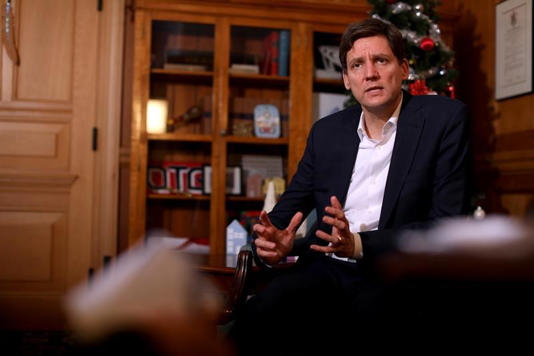
VICTORIA — Premier David Eby says he had a heartbreaking phone call with the father of a 12-year-old British Columbia boy who killed himself after falling prey to online sextortion, and he hopes to honour the boy by seeking more online protections for youth.
He said the NDP government is planning changes in the new year in memory of Carson Cleland of Prince George, who police said died in October after being sexually victimized online.
The premier said he spoke with Carson’s father, Ryan Cleland, who told him that parents of Carson’s classmates said their children were also talking online with strangers.
“I talked to Carson’s dad and the courage of him and his family to come forward, especially given the loss they faced over the holiday season, which has got to be just so awful, is remarkable,” Eby said.
“His dad said (they’ve) been contacted by three families from Carson’s class where the kids were talking with strangers through their social apps online just like (Carson) was,” he said.
“I think having had that conversation with him that there’s an opportunity for the province to make sure Carson’s memory is honoured and we actually go after the real threats that kids are facing.”
The changes might include finding ways to support parents, helping them monitor their children’s social media activity, and addressing how social media increases childhood anxiety, Eby suggested.
“I just really felt it talking to Carson’s dad because I’ve got a nine-year-old at home and already I’m hearing from him how important it is for him that he needs to have a cellphone,” he said.
Eby said people from across B.C. had contacted his office saying their children were in situations similar to Carson’s and they only found out due to publicity surrounding the boy’s death.
“A lot of it comes through the devices they are carrying around at school, through social media and the material they are fed and the predators who are taking advantage of that,” Eby said.
B.C. joined the federal government and Quebec last summer by suspending advertising on Facebook in response to the social media giant’s decision to block Canadian news after the federal government passed its online news act.
Mounties in Prince George issued a statement last month, more than six weeks after Carson died, warning parents about the risks youth face on the internet. The statement said officers went to the boy’s home on Oct. 12 and found him with a gunshot wound, and their investigation later determined he killed himself as a result of online sextortion.
Carson’s family said at the time he often used the social media platform Snapchat to communicate with others.
Eby’s remarks about the tragedy came in a year-end interview.
In other comments, he described the rise of B.C.’s upstart Conservatives as “awful” for bringing conspiracy theories and a potential “culture war” to the province’s politics.
Eby said he took no joy in the Conservatives potentially splitting right-of-centre votes with the Opposition BC United, formerly the B.C. Liberals, during this fall’s provincial election. The B.C. Conservatives achieved official party status this year, with two seats in the legislature, both courtesy of defections from the main opposition party.
“People say, you must be happy about the rise of the B.C. Conservative Party in the province,” said Eby. “Far from it. I find the rise of a party that embraces the kind of crazy conspiracy theories the B.C. Conservatives have embraced is quite terrifying.”
B.C. benefits from being a stable, open and diverse province that embraces science and education, while the Conservatives support climate change deniers, reject vaccine mandates and battle teachers and librarians who try to keep children safe in schools, he said.
“It is a completely different kind of political party and it threatens to bring the divisiveness of the culture wars in the United States to B.C. in a way that’s not just going to drive us apart socially, but is going to cost us economically,” said Eby. “I find it awful.”
Source: Dirk Meissner, The Canadian Press
